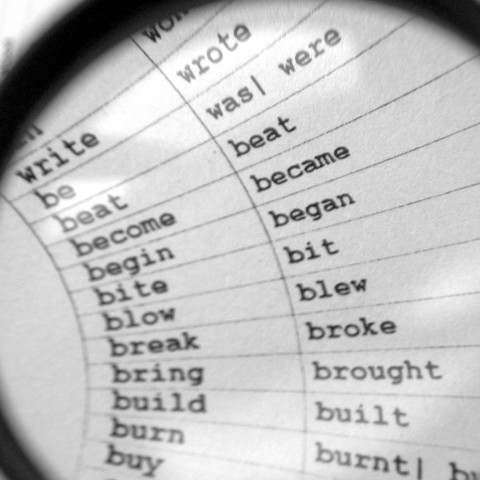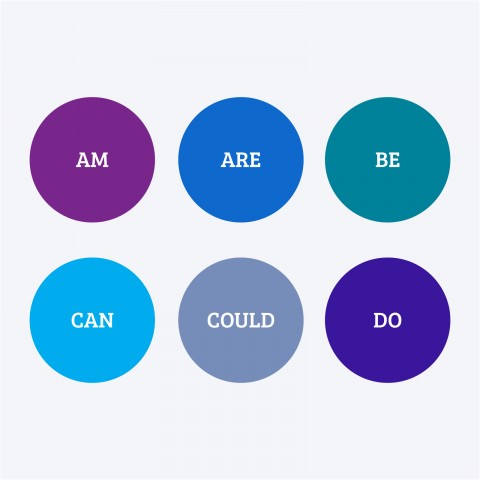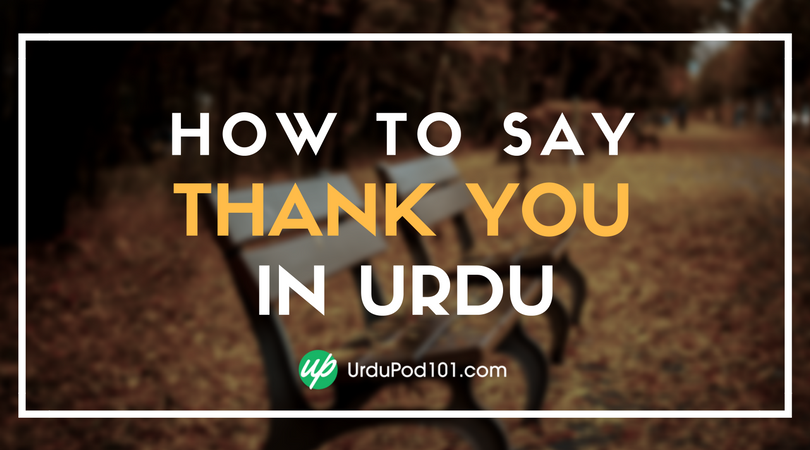
You don’t have to be a practicing grammarian in order to know the significance of the Urdu verb in a sentence or to realize the need to learn English verb tenses in Urdu. As is the case in many other major languages, learning the proper usage of verbs in different sentences or phrases is a huge step toward excellence in the Urdu language. Here, in this article, we’ll wade through a simple Urdu verbs list and give you some information on Urdu verbs conjugation (though we’ll soon have a separate article on the latter).
Are you ready to learn Urdu verbs and enhance your language skills? Let’s get started!
 Table of Contents
Table of Contents
- Why is it Important to Study 100+ Common Verbs?
- Verb Grouping According to Ending Syllables
- Placement and Usage of Verbs in Urdu
- Action Verbs in Urdu
- Mental Verbs in Urdu
- Urdu Helping Verbs
- A List of Some Unavoidable Verbs in Urdu
- Conclusion
1. Why is it Important to Study 100+ Common Verbs?

UrduPod101.com has already introduced you to Urdu nouns, Urdu pronouns, and Urdu adjectives. Having learned these, it’s now imperative to master the Urdu verb—فعل (fail)—so that you can form complete thoughts and ideas in your sentences.
Knowing different verbs in Urdu and how they work will give you the ability to understand and formulate various Urdu phrases and sentences. Consequently, your skills in every aspect of the language will see great improvement.
2. Verb Grouping According to Ending Syllables

For a beginner, some Urdu verb forms and variants may prove to be quite intricate, and the learner may become confused. Keeping this in view, the best strategy to avoid this confusion is to know the basic form of Urdu verbs: the infinitive.
A. The Basic Form of Urdu Verbs
Urdu infinitive verbs always possess the ending syllables نا (na). For instance:
- چلنا (chalna) — to walk
- رکنا (rukna) — to stop
- کھانا (khana) — to eat
- پینا (peena) — to drink
All such verbs in their basic forms function to mean/represent an act of doing, happening, or being in a state. This is the most basic definition of a verb in Urdu.
B. Variations Based on Urdu Verb Tenses
Keeping the base form of Urdu verbs in mind, let’s discuss how Urdu verb forms vary based on changing tenses.
Here, it’s appropriate to discuss only three forms of Urdu verbs, which signify three general tenses: present simple, past simple, and future simple.
While the Urdu infinitive verbs end with the syllables نا (na), the ending syllables change according to the tenses:
- Present Simple Tense: تا ہے/تی ہے (ta hai) / (ti hai)
- Past Simple Tense: یا/یی (ya)/(yi) or یا تھا/یی تھی (ya tha) / (yi thi)
- Future Simple Tense: گا/گی (ga) / (gi)
This also implies that the Urdu language has no irregular verbs! Additionally, as there’s not an extensive use of the intransitive verb in Urdu, you don’t need to bother learning the details about transitive and intransitive verbs in Urdu.
Below is an example illustrating how an Urdu verb conjugates in all of the above-mentioned forms.
- کرنا (karna) — do [base form]
- کرتا ہے (karta hai) — does [present simple]
- کیا (kiya) — did [past simple]
- کرے گا (karay ga) — will do [future simple]

C. How Grammatical Gender Impacts Verbs in Urdu
In Urdu grammar, verbs must match the gender of other words around them.
While learning about grammatical gender’s impact on Urdu verbs is not the topic of this article, it’s still important to have a general idea of how this works. After reading our explanation, you can look again at the examples above to see the changes for yourself!
Masculine Ending Syllables:
- تا ہے (ta hai)
- یا / یا تھا (ya) / (ya tha)
- کرے گا (karay ga)
Feminine Ending Syllables:
- تی ہے (ti hai)
- یی/یی تھی (yi) / (yi thi)
- کرے گی (karay gi)
3. Placement and Usage of Verbs in Urdu

Urdu grammar has its own idiosyncrasies when it comes to the placement of a verb in a sentence. For this reason, it’s vital that we go over this topic before proceeding further.
Basic Urdu Syntax
In English, the Subject + Verb + Object (SVO) sentence pattern is typically used. However, Urdu uses a different sentence pattern structure. Take a look:
وہ کھانا کھاتا ہے۔
V + O + S
(Woh khana khata hai.)
This is the basic Urdu syntax. Note that in Urdu syntax, the subject is followed by the object, and the verb is at the end.
4. Action Verbs in Urdu

Action verbs are those words that simply express an action, and sometimes possession. Below is a list of the most common Urdu verbs used for this purpose.
- دوڑنا (dorna) — to run
- لڑنا (larna) — to fight
- رونا (rona) — to cry
- ہنسنا (hansna) — to laugh
- گانا (gana) — to sing
- کھیلنا (khelna) — to play
- پڑھنا (parhna) — to read
- کھڑے ہونا (kharay hona) — to stand up
- بیٹھ جانا (baith jana) — to sit down
- سوار ہونا (swar hona) — to ride
- سننا (sun-na) — to listen
- بند کرنا (band karna) — to close
- کھولنا (kholna) — to open
- چلانا (chalana) — to turn on
- بند کرنا (band karna) — to switch off
- جیتنا (jeetna) — to win
- ہارنا (harna) — to lose
- لکھنا (likhna) — to write
- پکانا (pakana) — to cook
- دھونا (dhona) — to wash
- دینا (dena) — to give
- لینا (lena) — to take
- انتظار کرنا (intizar karna) — to wait
- کودنا (kodna) — to jump
- بات کرنا (baat karna) — to talk
- چومنا (choomna) — to kiss
- گلے ملنا (galay milna) — to hug
- نہانا (nahana) — to bathe
- خریدنا (khareedna) — to buy
- بیچنا (bechna) — to sell
- سونگھنا (soonghna) — to smell
- تالی بجانا (tali bajana) — to clap
- بننا (bun-na) — to knit
- سینا (seena) — to sew
- دھکیلنا (dhakelna) — to push
- کھینچنا (khenchna) — to pull
- چڑھنا (charhna) — to climb
- کھودنا (khodna) — to dig
- جھکنا (jhukna) — to bow
- غوطہ لگانا (ghota lagana) — to dive
Example Sentences
- وہ روزانہ پارک میں دوڑتی ہے۔
woh rozana park mei dorti hai.
She runs in the park daily.
- اس نے دریا میں غوطہ لگایا۔
uss nay darya mein ghota lagaya.
He dived into the river.
- میں کلاس لوں گا۔
mei class loon ga.
I will take my class.
- تم نے اس کو کتاب کیوں دی؟
tum nay uss ko kitab kyu di?
Why did you give him the book?
- میں ایک کار خریدنا چاہتا ہوں۔
mei aik car khareedna chahta hun.
I want to buy a car.
5. Mental Verbs in Urdu

Mental verbs show different mental actions. Below you’ll find some examples of common mental verbs in Urdu.
- سوچنا (sochna) — to think
- فیصلہ کرنا (faisla karna) — to decide
- جاننا (jan-na) — to know
- یقین کرنا (yaqeen karna) — to believe
- شک کرنا (shak karna) — to doubt
- فرض کرنا (farz karna) — to suppose
- پہچاننا (pehchan-na) — to recognize
- بھولنا (bhoolna) — to forget
- یاد رکھنا (yaad rakhna) — to remember
- رد کرنا (rad karna) — to deny
- وعدہ کرنا (waada karna) — to promise
- مطمئن کرنا (mutmain karna) — to satisfy
- احساس کرنا (ahsaas karna) — to realize
- اتفاق نہ کرنا (itefaq na karna) — to disagree
- حیران کرنا (hairan karna) — to astonish
Example Sentences
- میں آپ سے اتفاق نہیں کرتا۔
mei aap say ittefaq nahi karta.
I disagree with you.
- تم اس کی غلطی بھول گئے۔
tum uss ki ghalati bhool gaye.
You forgot his mistake.
- کیا تم نے فیصلہ کر لیا ہے؟
kya tum nay faisla kar liya hai?
Have you decided?
6. Urdu Helping Verbs
Helping verbs are significant in that they’re sometimes required to structure a sentence. They’re used to assist the main verb, and can be further divided into two main categories: modal verbs and auxiliary verbs. The exact translation of these verbs in Urdu is امدادی فعل (imdadi fael).
A. Modal Verbs in Urdu with Examples
Modal verbs serve to describe possibility, necessity, or obligation. They also help to modify specific tasks. Following are some Urdu modal verbs, followed by a few examples.
- سکتا ہے (sakta hai) — can
- سکا (saka) — could
- سکتا ہے (sakta hai) — may
- سکا (saka) — might
- کرے گا (karay ga) — will
- کیا (kiya) — would
- کرے گا (karay ga) — shall
- چاہئے (chahiye) — should / must / ought to
Example Sentences
- وہ تیر سکتا ہے۔
woh tair sakta hai.
He can swim.
- انٹرویو کے بعد آپ جا سکتے ہیں۔
interview kay baad aap ja saktay hain.
You may leave after the interview.
- وہ آپ کی مدد کرے گا۔
woh aap ki madad karay ga.
He will help you.
- آپ کو ائیرپورٹ پر وقت پر پہنچنا چاہئے۔
aap ko airport per waqt per pohanchna chahiye.
You should reach the airport on time.
- اسے یہ کتاب لازمی پڑھنی چاہئے۔
ussay yeh kitab lazmi parhni chahiye.
He must read this book.
B. Auxiliary Verbs in Urdu with Examples
The words “auxiliary” and “helping” are often used interchangeably. However, auxiliary verbs function to articulate the tense or to emphasize something. There are three main Urdu auxiliary verbs which have multiple variants. We’ll introduce them to you below.
ہونا (hona) — to be
- ہوں (hun) — am
- ہے (hai) — is
- ہیں (hain) — are
- تھا/تھی (tha/thi) — was
- تھے (thay) — were
رکھنا/چکنا (rakhna/chukna) — to have
- چکا ہے/چکی ہے (chuka hai/chuki hai) — has
- چکے ہیں (chukay hain) — have
- چکے تھے (chukay thay) — had
کرنا (karna) — to do
- کرتا ہے/کرتی ہے (karta hai/karti hai) — does
- کرتے ہیں (karty hain) — do
- کیا/کیاتھا (kiya/kiya tha) — did
Example Sentences
- میں خوش ہوں۔
mei khush hun.
I am happy.
- وہ میرے ساتھ ناراض تھی۔
woh meray saath naraz thi.
She was angry with me.
- وہ ہاکی کھیل چکے ہیں۔
woh hockey khail chukay hain.
They have played hockey.
- ہم کیک کاٹ چکے تھے۔
hum cake kaat chukay thay.
We had cut the cake.
- اس نے جھگڑے کا آغاز کیا۔
uss nay jhaghray ka aaghaz kiya.
He started the fight.

7. A List of Some Unavoidable Verbs in Urdu
To continue our list and further expand your Urdu verbs vocabulary, let’s look at a few more must-know verbs in Urdu that will make your life more convenient in an Urdu-speaking country.
- پیار کرنا (pyar karna) — to love
- نفرت کرنا (nafrat karna) — to hate
- کہنا (kehna) — to say
- بتانا (batana) — to tell
- ستانا (satana) — to tease
- عزت کرنا (izat karna) — to respect
- بے عزت کرنا (bayizat karna) — to humiliate
- ملنا (milna) — to meet
- اکٹھا کرنا (ikatha karna) — to collect
- جدا کرنا (juda karna) — to separate
- سونا (sona) — to sleep
- جاگنا (jagna) — to wake up
- زندہ رہنا (zinda rehna) — to live
- مرنا (marna) — to die
- آنا (aana) — to come
- جانا (jana) — to go
- مزہ لینا (maza lena) — to enjoy
- دوڑنا (dorna) — to run
- مسکرانا (muskurana) — to smile
- معاف کرنا (maaf karna) — to forgive
- معافی مانگنا (maafi mangna) — to apologize
- کھانسنا (khansna) — to cough
- گرنا (girna) — to fall
- اٹھنا (uthna) — to get up
- پڑھانا (parhana) — to teach
- دبانا (dabana) — to press
- مارنا (marna) — to beat
- قتل کرنا (qatl karna) — to kill
- بچانا (bachana) — to save
- بولنا (bolna) — to speak
- شور کرنا (shor karna) — to make a noise
- پوچھنا (poochna) — to ask
- سوال کرنا (sawal karna) — to question
- جواب دینا (jawab dena) — to reply
- داخل ہونا (dakhil hona) — to enter
- حاصل کرنا (hasil karna) — to get
Example Sentences
- اس نے بے گناہ لوگوں کو قتل کیا۔
uss nay baygunah logon ko qatl kiya.
He killed innocent people.
- آپ نے ایک اچھا سوال پوچھا ہے۔
aap nay aik acha sawal pucha hai.
You have asked a good question.
- آپ میٹنگ میں کب آؤ گے؟
aap meeting mein kab aao gay?
When will you come to the meeting?
- وہ بہت اچھا پڑھاتا ہے۔
woh bohat acha parhata hai.
He teaches very well.
- میں آج ہوٹل میں نہیں جاؤں گا۔
mei aaj hotel mein nahi jaon ga.
I will not go to the hotel today.
8. Conclusion
We hope you enjoyed learning about Urdu verbs with us! Are there any verbs we didn’t cover that you still want to know? Let us know in the comments!
After reading this article carefully, you should have a better understanding of Urdu verbs and how they work. This will allow you to properly use them in sentences for more effective communication. Practice them well and you’re sure to get desired results!
At UrduPod101.com, we always do our best to ensure that our content is informative, up-to-date, and easy to understand. For this reason, we always look forward to hearing your feedback and other comments so that we can continually improve. Don’t hesitate to reach out with any questions or concerns you may have—we’ll do our best to help!
Very Happy Urdu Learning!










